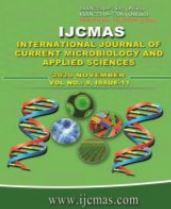


 National Academy of Agricultural Sciences (NAAS)
National Academy of Agricultural Sciences (NAAS)

|
PRINT ISSN : 2319-7692
Online ISSN : 2319-7706 Issues : 12 per year Publisher : Excellent Publishers Email : editorijcmas@gmail.com / submit@ijcmas.com Editor-in-chief: Dr.M.Prakash Index Copernicus ICV 2018: 95.39 NAAS RATING 2020: 5.38 |
Lymphadenopathy referred as lymph node enlargement is the most common problem in dogs, may be due to inflammatory or non-inflamma¬tory conditions including neoplasm.In case of cattle and buffalo, Theileriosis showed lymph node enlargement as the most common complaint. It is not a specific disease entity but an important clinical finding; the cause should be ascertained to attempt treatment and prognosis. Enlargement of lymph nodes often occurs following the proliferation of resident normal cells or infiltration of outside normal or abnormal cells. Rarely, this enlargement can be caused by vascular changes (congestion, vascularization, and edema). Common causes of lymphadenopathy include neoplasia (lymphosarcoma and metastatic neoplasia), hyperplasia or reactive lymphadenopathy, lymphadenitis (neutrophilic, purulent, eosinophilic, pyogranulomatous, or granulomatous), immune stimulation, and extra medullary hematopoiesis. Lymph node cytology is an excellent way to evaluate a lymphadenopathy whether it is a single node enlarged, multiple nodes enlarged, or a generalized lymphadenopathy. This review, therefore, provides an overview of the various conditions that are associated with lymphadenopathies in canines and bovines.
 |
 |
 |
 |
 |